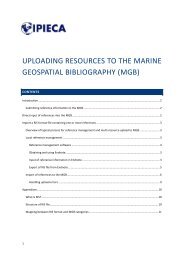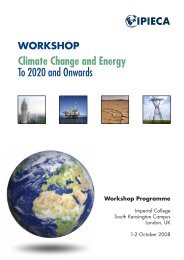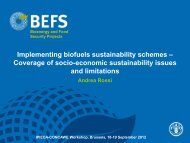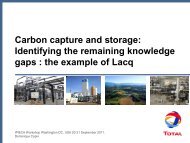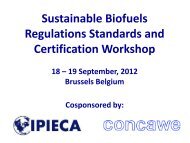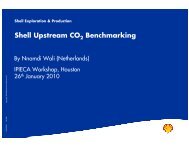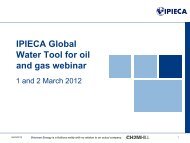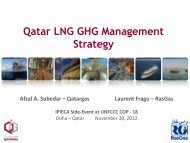WSSD Report FINAL! - OGP
WSSD Report FINAL! - OGP
WSSD Report FINAL! - OGP
You also want an ePaper? Increase the reach of your titles
YUMPU automatically turns print PDFs into web optimized ePapers that Google loves.
CONTRIBUTING TO SUSTAINABLE DEVELOPMENT<br />
to local consumers. This transfer of knowledge<br />
also includes novel technologies to control or<br />
reduce environmental impacts of activities and<br />
products. We promote technology transfer<br />
directly and through a variety of partnerships.<br />
Capacity building encompasses the management<br />
systems and skills required to operate<br />
complex equipment and technology safely and<br />
efficiently and to improve business performance<br />
while protecting the environment and helping<br />
communities to develop. For economic growth<br />
to be sustainable—and benefit all—governments<br />
need to combine policies that promote a<br />
vibrant private sector, provide education and<br />
health care for all and maintain a framework of<br />
justice and security. Effective states and efficient<br />
markets work best in tandem.<br />
Both technology transfer and capacity building<br />
depend on all these factors—and more. Also<br />
needed are an appropriate enabling environment<br />
and reliance on diverse partnerships<br />
that embrace industry, local<br />
communities, governments and<br />
NGOs. IPIECA and UNEP have<br />
jointly published a report entitled<br />
The Oil Industry Experience:<br />
Technology Cooperation and<br />
Capacity Building—Contribution<br />
to Agenda 21, which illustrates<br />
some of our industry’s<br />
successes—as well as lessons<br />
learned from such partnerships.<br />
All of this narrows down to a simple reality:<br />
around the world, oil and gas companies are<br />
striving to operate their locally registered companies<br />
by employing and training local people at<br />
every level and to encourage locally sustainable<br />
businesses, all of which increase society’s capacity<br />
to realize economic and other benefits from oil<br />
and gas operations.<br />
The challenges ahead<br />
In the past 10 years, despite wars, natural disasters<br />
and economic volatility, the oil and gas<br />
industry has kept the world supplied with the<br />
raw materials and products it needs. Given an<br />
enabling environment—one that encourages<br />
investment and risk taking—we are confident in<br />
our continuing ability to meet the globe’s<br />
energy needs for decades to come.<br />
On what do we base this confidence? At the<br />
most conservative estimate, the world’s ultimate<br />
conventional oil recovery (including past production<br />
of around 800 billion barrels) is around 1800<br />
billion barrels. Estimates from the International<br />
Energy Agency are more optimistic at around<br />
2300 billion barrels of oil as a result of technological<br />
progress. In terms of natural gas, resources<br />
are even more extensive. Only some 20 per cent<br />
of estimated world total natural gas supplies have<br />
so far been found. Huge supplies remain in many<br />
different parts of the globe.<br />
Does that mean business as usual for the oil<br />
and gas companies? Far from it.<br />
In concentrating on securing future supplies<br />
of oil and gas we have perhaps paid less attention<br />
to other, equally important aspects of our business.<br />
As a result, we are sometimes perceived as<br />
arrogant, topdown, non-participative polluters,<br />
more interested in providing cheap energy to<br />
developed nations than fostering long-term<br />
prosperity elsewhere. Because the scale of our<br />
operations can dwarf entire national economies,<br />
we have been criticized for failing to use that<br />
clout as an instrument for positive change.<br />
Clearly, the oil and gas industry has<br />
unfinished business in our dealings with<br />
governments, local communities, relevant NGOs<br />
and multilateral agencies. As part of doing business<br />
better in the 21st century, we will have to<br />
Energy markets: primary energy mix<br />
Global consumption, indexed to 1990<br />
130<br />
120<br />
110<br />
100<br />
90<br />
gas<br />
oil<br />
coal<br />
Below: as energy<br />
use continues to<br />
increase, the oil<br />
and gas industry<br />
is confident in its<br />
ability to meet<br />
future energy<br />
needs.<br />
1990 1992 1994 1996 1998 2000<br />
Source: BP Statistical Review<br />
9




